[ad_1]
Steve Mastin doesn’t want to talk about politics.
That may come as a bit of surprise if you read his Conservative argument against grammar schools in this newspaper earlier this month.
But while it might be easy to typecast some teachers for their political activism, it can also be foolish, as there’s almost always more to their story.
Mastin, the vice-chair of the Conservative Education Society, is no exception. Having taught and then led history in a Cambridgeshire state school for 17 years before two as a subject specialist for one of the country’s highest-profile academy trusts, he now helps develop curriculums world-wide.
He runs his own secondary consultancy, but is also the co-founder with Christine Counsell of Opening Worlds, which provides a “knowledge-rich humanities programme for teaching history, geography and religion in years 3 to 6”.

For Mastin, born to a Scottish mother and English father but privately educated in Brisbane, Australia, teaching was his “destiny” from an early age.
He remembers his father making a blackboard for his bedroom where he “used to sit up teddy bears in seats to teach them lessons”.
“It was a trajectory from I think the moment I started school. I was inspired by teachers and the power to teach, the power to inspire.”
He credits his “inspirational” history teacher, Max Wilkinson, who had “one of those booming voices that he didn’t need to project” with instilling a love of history.
“When it came to storytelling, he was a master,” Mastin recalls.
Returning to the UK, he studied history and classics at the University of St Andrews in Scotland, where he developed a love for “reading, writing, discussing and arguing”.
‘There’s a sense of nobility about teaching’
His application for teacher training in Edinburgh was rejected. He was working in Burger King and had resigned himself to a year out working at Jenners department store when a teacher friend advised him to apply to do a PGCE at Cambridge.
“I phoned them up. They’d had one person drop out of their PGCE course for history, starting the next week! And they said, well, can you get here tomorrow for an interview? So I booked a train. And that was it.”
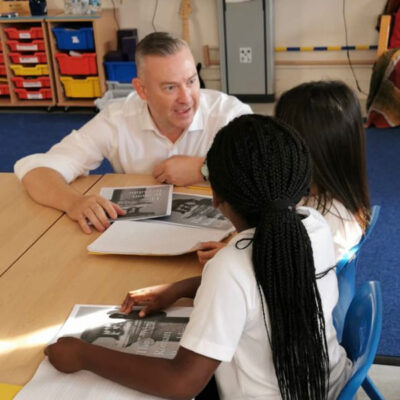
Walking into a classroom for the first time was a “mixture of a huge excitement, because you’re going to set the world on fire, and also nerves, a knot in the pit of your stomach”.
“If it doesn’t sound too pretentious, there’s a sense of nobility about teaching,” he tells me.
“The idea of giving of yourself to other people, and expecting nothing in return. Standing up there, you realise that there are 30 people in front of you, and you’re responsible for their education. That’s a huge responsibility.”
Mastin settled in Cambridgeshire, and worked at Sawston Village College for 17 years. He still sings the praises of England’s comprehensive school system, where he was teaching kids from the local council estate, the children of Trinity College fellows and “everything in between”.
“The wonderful thing about growing up in this country is that you have an entitlement, no matter where you come from, whatever your background, to a good history education. That’s why grammar schools, I think, are not the solution to anything.”
‘The government should wipe teachers’ uni debt’
Mastin holds firm on his stance of no politics, but he does occasionally stray, and his views certainly don’t pigeonhole him as a Tory.
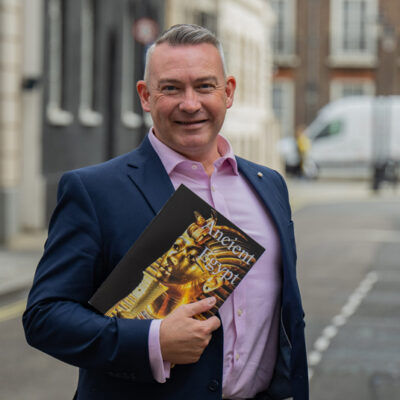
He believes all children should receive free school meals, for example, and says he would “love to see a government of whatever political colour pay for people to train to teach in the state sector”.
“So if you do your degree in history, and you then do a PGCE, and you then go and teach in the state sector for five to eight years, the government will wipe your debt. The Royal Navy does it. I think it would be a great policy.”
He may not have a full timetable anymore, but Mastin says he insists on teaching “whenever I go into a school”.
In 2017, Counsell recruited him to join the Inspiration Trust’s team of subject experts. This was a “hugely positive experience” in which he expanded his work to the primary phase.
‘I take my hat off to primary teachers’
“Primary school teachers, they have to be Leonardo da Vincis. They have to be good at every subject, experts in everything. Whereas in secondary, you can specialise in history, or geography or religion. But primary teachers – I take my hat off to them.
“It’s just so inspiring to see a teacher who can get excited about number bonds when they’re teaching the difference in hundreds and thousands. And then in the next lesson, they’re teaching about Baghdad. Then after that they’re teaching about rivers.”
After 17 years at Sawtson and two at Inspiration, Mastin set out on his own, something he’d been keen to do for some time.
“As much as I’d loved being a head of history, I was finding myself asked to do other things. For example, every summer holiday I was going out to central Asia, working for three weeks with ministries of education, helping them to improve their history curriculum.”
‘Looking for a way to tell their national story’
He worked in Kazakhstan, where the country’s national story had, he said, been “subsumed under a Soviet identity” for decades.
“They were looking for a way of telling their national story, but telling it in a way that was rigorous. So it wasn’t just storytelling. It was faithful to the discipline of history.”
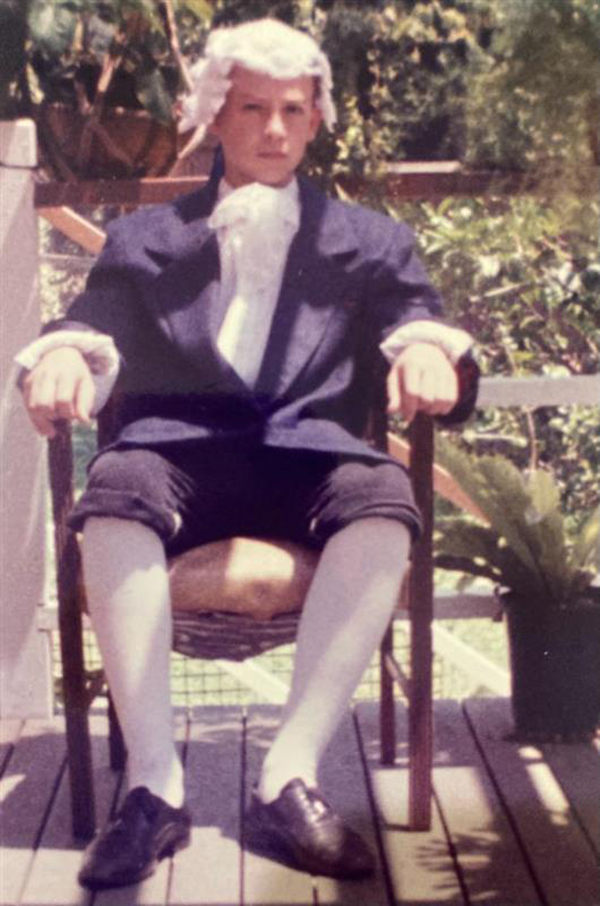
Soon he was being asked to do work in Egypt and Singapore, as well as other parts of England; the idea of a consultancy was born.
Branching out was “quite nerve-racking”, he admits, from “a very safe job in a lovely school with a great history team… It can become quite comfortable.”
“But when the job came up across 14 schools in a trust, I thought, wow, what an offer. So I did it. And they were very responsive. They allowed me to do many of these things that I was wanting to do. I gave them two years and then moved on.”
Mastin now splits his time between his consultancy work in secondary schools and the Opening Worlds business.
Its curriculum is knowledge-rich, and “sequenced from one year to the next year to the next year”.
That curriculum sequencing is key, Mastin believes. He cites the example of a school in north London that faces “lots of challenges”. Having taught six lessons “thoroughly” on Ancient Egypt, the school then took its pupils to the British Museum.
“So instead of doing the trip first to inspire them, they did it after, so the children were going around saying, ‘that’s the double crown that the Pharaohs wore’. Oh, what’s the double crown? ‘That means he’s Pharaoh of Upper Egypt’. Oh, what’s Upper and Lower Egypt? ‘Well, the River Nile separated them’. Brilliant, brilliant.
‘Knowedge-rich isn’t about party politics’
“I would say most schools in the country cover Ancient Egypt. But the difference between a knowledge-rich curriculum, and what you might call an information-rich curriculum, where you just throw lots of facts at children…is where you link it up, where you make that connection.”
The knowledge-rich approach has become somewhat synonymous with the work of Nick Gibb, the long-serving schools minister who recently returned to the Department for Education after a brief stint on the backbenches.
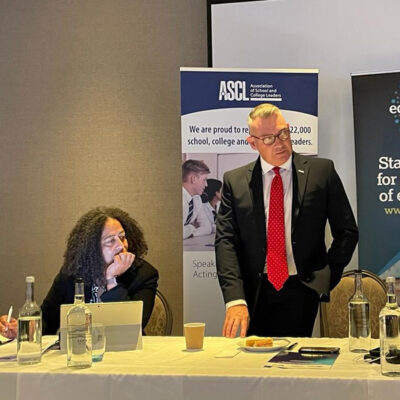
But Mastin insists the approach has “nothing to do with party politics”, and describes the knowledge vs skills debate raging in education as “silly”.
“It’s to do with these children having a rich, deep, secure and fun understanding of these civilisations in Asia and Africa and Europe and being able to make connections and compare them,” he says.
“It’s only when you have a secure knowledge of each one, that you can have a conversation where you start comparing and contrasting. You can’t compare and contrast if you don’t know enough.
“One of the biggest liberators and equalisers, one of the biggest proponents of social justice is a knowledge-rich curriculum. I don’t do it because of politics. I do it because it works.”
What has Mastin made of the debate around how schools teach about the British Empire?
Kemi Badenoch, then equalities minister, said earlier this year that schools needed to teach “both sides of the story”. But Mastin disagrees.
‘Teaching empire is not a balance sheet question’
He says you “might still find some history teachers somewhere that still regard the teaching of empire as a balance sheet, pros and cons”, but “in the wider history community that’s not an argument”.
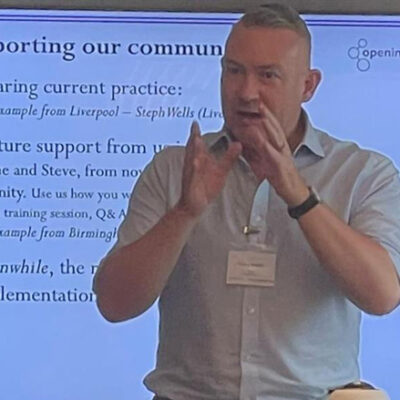
“Not only is it not rigorous, historical thinking, it’s not the sort of question a historian would ask. The idea that you would do that with Oliver Cromwell, or that you would do that with the Vikings. Good or bad? It’s not a rigorous historical question.
“You wouldn’t do it with the Ancient Egyptians. And I wouldn’t do it with the British Empire. It reduces it to quite superficial ways of thinking and is really unhelpful.”
Mastin believes history teaching in England is admired overseas in part because the sector is “having honest conversations about things like rigorous historical thinking, and also hidden voices, voices that for decades have been missed in the teaching of empire”.
“And we’re now looking at, thinking about indigenous voices in Australia, or in Canada, or in Kenya, or Tanzania, or wherever it was that the British colonised.
“We’re not looking at it simply from a British perspective, we’re looking at it from an indigenous perspective. And that’s a positive thing. I don’t think that’s controversial.”
[ad_2]
Source link
Meet Our Successful Graduates: Learn how our courses have propelled graduates into rewarding
careers. Explore their success stories here!
Discover More About Your Future: Interested in advancing your teaching career? Explore our
IPGCE, MA, and QTS courses today!

Explore Our Courses: Ready to take the next
step in your education journey? View our
comprehensive course offerings now!

